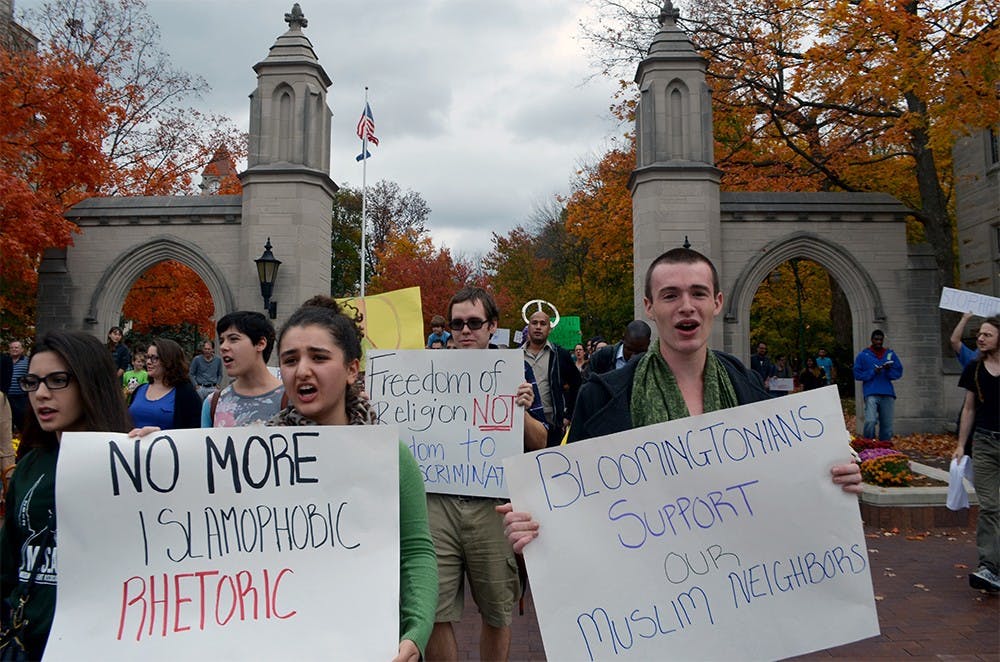Saturday marked the Day of Ashura, a holiday during which Muslims remember Nuh’s journey, specifically the day his ark landed safely on dry land.
This year, many of Bloomington’s Muslims gathered for a different reason. Under darkening storm clouds, they spent the afternoon rallying against the hatred that continues today, thousands of years after Nuh is said to have built his boat.
Fariha Hossain’s black haajib blew around her face as she tried to make herself heard over the wind.
The IU junior loves sushi but doesn’t like avocados, she announced to the crowd of people filling the courthouse lawn. Her favorite animal is a dolphin and she’s pre-dental. She also prays five times a day.
Hossain’s Muslim beliefs are important to her, she explained, but they don’t define her.
As the president of IU’s Muslim Student Union, Hossain was just one of the speakers at the Bloomington Against Islamophobia rally. The march was organized as a sign of support and solidarity after an IU student attacked a Muslim woman last week.
Looking over the sea of “Hoosiers not haters,” “Stop Islamophobia,” and “Bloomington against racism” signs, Hossain invited the group to reach out to Muslim members of the Bloomington community and get to know them as people.
These kinds of interactions, she said, foster understanding. This kind of understanding, she said, is what might stop people from strangling perfect strangers.
“Hey hey, ho ho, Islamophobia has got to go,” protesters chanted, filling the street as they moved down Kirkwood Avenue.
“When Muslim rights are under attack, what do we do? Stand up, fight back,” they yelled, while pushing signs toward the gray sky.
People eating at restaurants along the street cheered, whistled and sometimes joined in.
Participants representing many races, religions and ages all shouted in unison. Along with messages of acceptance and religious freedom, the ralliers preached forgiveness.
“He is a 19-year-old, and we don’t want his future to be destroyed,” said Hermayat Shahrani, a representative of the Islamic Center of Bloomington, in reference to the attacker, Triceten Bickford.
Shahrani was one of several attendees who said they were unhappy to hear of Bickford’s recent expulsion from IU. He more than anyone, they argued, is in desperate need of education.
He made a mistake, they don’t deny that, but he doesn’t deserve to drown for it.
“When we are faced with intolerance, the best way to react is with tolerance,” Shahrani said.
For Joseph Varga, however, tolerance is not enough.
“I don’t want to be tolerated,” the IU professor of labor studies said into the megaphone. As a queer man, Varga said he has experienced plenty of discrimination. “You can take your tolerance and stick it. We can do better than tolerance.”
In order to do better, speakers said improvements need to be made at every societal level.
Drone warfare against Muslim nations and racist statements from prominent political figures were just two cited examples of how Islamophobia is being cultivated in America.
“Have you even heard of an American Muslim presidential candidate?” asked Sinno Abdulkader, an IU professor of political science, when talking about how Islam has been used as an insult in the political sphere. “Why is it even an issue? They keep repeating these accusations of Obama being Musllim as if there is something wrong with being Muslim.”
Other speakers reiterated the feelings of frustration and exhaustion.
“I can’t believe we’re still protesting this shit,” said Purnima Bose, an associate professor of English at IU, quoting a phrase that has recently been used in protests for social justice issues across the country.
As the winds picked up force, children played amongst themselves on the outskirts of the rally, tuning out the anti-hate messages they don’t yet understand the need for.
“We wanted to explain to them what happened without scaring them,” Bloomington resident Arie Munigar said of her young daughters. “We want them to be able to explain their faith with self-confidence.”
Munigar’s children laughed while climbing a tree nearby. As they dangled from the branches, their purple and blue hijabs hung toward the ground. They like wearing their head coverings, they said. It reminds them of their religion.
Though the scarves are sometimes labeled as signs of sexism, many of the women at the rally shared these feelings of gratitude for the religious covering.
“You start to recognize that people aren’t focusing on the things that you’re talking about,” Abigail Al Omari said of not wearing a headscarf. “They’re looking at your breasts if you’re wearing a low-cut shirt, or they’re talking about how your hair’s not perfect. For me, being veiled is a feminist statement.”
Even as the rally came to a close with a final bout of cheers, the event’s organizers said the movement is far from over. They hope to organize a monthly public forum in which a member of the Muslim community talks with an academic about local issues, the rally's organizers, Amanda Lanzillo and Denisa Jashari, said.
These forums are one way to create a stronger community. Smiling is another, Hossain said.
“If you ever want to talk to a Muslim person, start by smiling at them,” she told the group. “We’re sort of religiously required to smile back. Smiling is an act of worship.”
After the chanting had stopped and the courthouse lawn had emptied, the clouds swelled and the rain began to pour.






